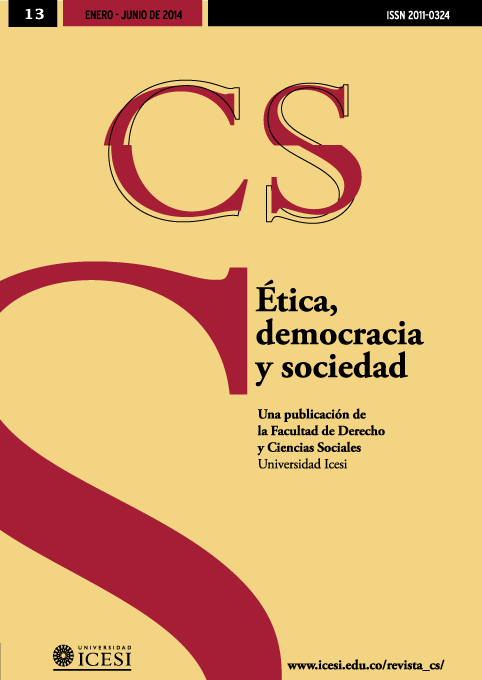Emptied Bodies and Territories: What is the paradigm of difference? How is difference conceived?
DOI:
https://doi.org/10.18046/recs.i13.1830Keywords:
Difference, Discrimination, Emptied Bodies, Emptied Territories, Afro–Colombian womenAbstract
This article presents a reflection on the paradigm of difference and its implications for everyday social relationships mediated through ethnic–racial, sexual, gender and class issues. It describes how some of the most strongly held beliefs of human beings take shape during the socialization process. Additionally, it proposes the concepts 'Emptied Bodies' and 'Emptied Territories' as analytical categories to discern the implications of imposing prejudices and stereotypes on realtionships, and to make explicit how the act of not thinking critically about difference entails the denial of others. In conclusion, it posits the argument that to conceive difference is to allow to live and let live, as long as these actions do not imply invalidating the existence of others.
Downloads
References
Achebe, C. (2000). Entrevista. http://www.theatlantic.com/past/docs/unbound/interviews/ba2000–08–02.htm (Consultado Marzo, 29. 2014)
Adichie, C, N. 2009. The danger of a single story. http://www.ted.com/talks/chimamanda_adichie_the_danger_of_a_single_story.html (Consultado Octubre 15, 2009.)
Boyd–Bowman, P,M y Sharp, W. (1981). Description of the province of Zitara and course of the At rato River. Special Studies Series. Council on Internacional Studies. State University of New York at Buffalo
Dussel, E. (1994). 1492: el encubrimiento del otro: hacia el origen del mito de la modernidad. UMSA. Facultad de Humanidades y Ciencias de la Educación. La Paz: Plural Editores
Guzmán Campos, G, Fals Borda,O y Umaña,E. (1962). La violencia en otras regiones. La Violencia en Colombia .Estudio de un proceso social. Tomo I. Bogotá, Ediciones Tercer Mundo.
Lao-Montes, Agustin. 2013. Empoderamiento, descolonización y democracia sustantiva. Afinando principios ético-políticos para las diásporas Afroamericanas. Revista CS, 12, 53-84
Mena García, M. I. (2013). Niñas afrodescendientes (afrocolombianas, negras, raizales y palenqueras) en las políticas públicas de mujer y género. Ponencia presentada. Ponencia presentada en el Conversatorio propuesta metodológica para la implementación del enfoque diferenciado étnico y de género a favor de la mujer Afrodescendiente en la región. Encuentro Internacional de Mujeres Afro–descendientes: Experiencias en Políticas Públicas con Enfoque Étnico y de Género. Bogotá – Colombia.
Mills, C.W. (2007). White Ignorance. In Sullivan Shannon and Nancy Tuana ( Edit). Race and the epistemologies of ignorance. New York, U.S.A: SUNY.
Quijano, A. (2010). ¡Qué tal raza! En: Mosquera Rosero, Claudia, Agustín Laó–Montes y César Rodríguez Garavito (Edit.). Debates sobre ciudadanía y políticas raciales en las Américas Negras. Bogotá, D.C, Colombia: Universidad Nacional de Colombia. Universidad del Valle.
Quintela Di Maggio, S. '¿Descubrimiento o encubrimiento de América?. http://arielenlinea.files.wordpress.com/2010/11/04_descubrimiento.pdf. Consultado Mayo 16 de 2014
Romoli, K. (1975). El Alto Chocó en el siglo XVI. Revista Colombiana de Antropologia. Vol. XIX. Bogotá. Instituto Colombiano de Cultura. P. 14–16.
Vergara Figueroa, A. (2011). Ripped from the Land, Shipped Away and Reborn: Unthinking the Conceptual and Socio–Geo–Historical Dimensions of the Massacre of Bellavista. Masters Theses. Paper 570. http://scholarworks.umass.edu/theses/570
Downloads
Published
Issue
Section
License
Copyright (c) 2014 Aurora Vergara Figueroa

This work is licensed under a Creative Commons Attribution-NonCommercial 4.0 International License.
© Reserved Copyright
Material in this publication may be reproduced without authorization, provided the title, author and institutional source is acknowledged.
The content published in Revista CS is distributed under the Creative Commons BY-NC 4.0 Attribution/Recognition-NonCommercial 4.0 International license.
You are free to:
Share — copy and redistribute the material in any medium or format.
Adapt — remix, transform, and build upon the material.
Under the following terms:
Attribution — You must give appropriate credit , provide a link to the license, and indicate if changes were made . You may do so in any reasonable manner, but not in any way that suggests the licensor endorses you or your use.
NonCommercial — You may not use the material for commercial purposes.












